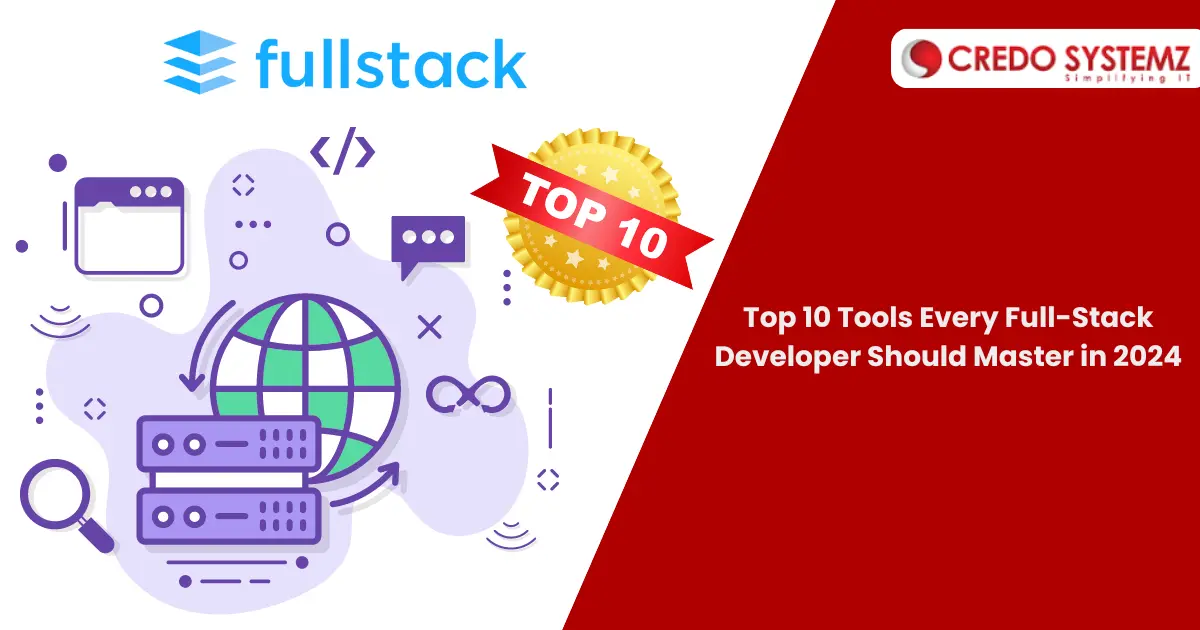
Introduction
The Full Stack developer is one of the most popular job roles in the tech field. They are valuable assets to any business with a broad skills set. These professionals possess proficiency in both front-end and back-end development. They need a broad range of technologies and skills. Let’s explore the important tools that have become indispensable for full stack developers.
Front-end development
In every application development, the front end development deals with user interactions. The indispensable tools of Front-end development are:
Code Editor
Visual Studio Code (VS Code) is a highly adaptable code editor. It is an essential tool for coding, debugging, and version control. VS Code is suitable for editing code in various languages like Python, JavaScript, C++, Java, HTML, CSS, and many others. It is highly customizable, and integrates seamlessly with Git.
React.js
React.js is the leading library for Front-end development. It is a powerful tool for building dynamic and responsive user interfaces with:
- Component-based architecture
- Virtual DOM
- Extensive community support
TypeScript
TypeScript is a valuable skill for writing robust and maintainable code. It extends JavaScript by adding static types. TypeScript helps in catching errors early during development and improving code quality.
Version control
For full stack development, Version control is crucial as it helps to:
- Manage changes to the codebase
- Collaborate with team members
- Maintain a history of the project’s evolution
Git and GitHub
Git is the most widely used version control system. It allows developers to track changes, create branches for new features, and merge code from different sources.
GitHub platform host Git repositories. It provides collaboration features, and offers tools for continuous integration/continuous deployment (CI/CD).
Back-end development
Back end development is a critical part of full stack development. It involves managing server-side logic, databases, and integration with front end components. The important tools of back end development for full stack developers are:
Node.js
Node.js is the key tool for building server-side applications. It allows developers to use JavaScript on the server side. Node.js enables full stack JavaScript development. It is renowned for its:
- Performance
- Scalability
- Large ecosystem of packages via Node Package Manager
Docker
Containerization has become a standard in modern back-end technologies. Docker allows developers to package applications and their dependencies into containers. It ensures consistent environments across different stages of development and deployment.
Kubernetes
For managing containerized applications at scale, Kubernetes is the go-to orchestration tool. It automates various processes, such as: Deployment, scaling, and management of containerized applications. Kubernetes is crucial for developers working on large-scale, distributed systems.
GraphQL
GraphQL provides a more efficient, powerful, and flexible alternative to REST for APIs. It allows clients to request exactly the data they need, reducing over-fetching and under-fetching of data. Mastering GraphQL is beneficial for optimizing data fetching in applications.
Jest
Testing is a critical aspect of development. Jest, a testing framework for JavaScript, is popular for its simplicity and powerful features. It provides a seamless testing experience for React applications and can be used for unit, integration, and end-to-end testing.
AWS (Amazon Web Services)
Cloud computing skills are increasingly vital for full stack developers. AWS, as a leading cloud platform, offers a wide range of services, including computing power, storage, and databases. Understanding AWS fundamentals and key services like EC2, S3, and Lambda is essential for deploying and managing applications in the cloud.
Conclusion
Mastering these tools will not only enhance your efficiency as a full stack developer but also keep you competitive in the evolving tech landscape of 2024. From powerful code editors and version control systems to modern frameworks and cloud platforms, these tools provide the foundation for building robust, scalable, and efficient applications.
